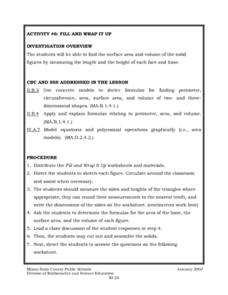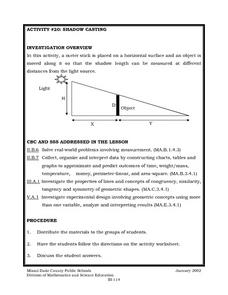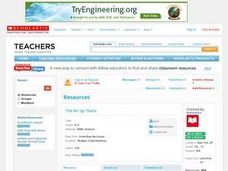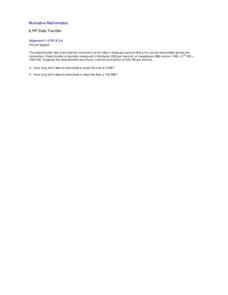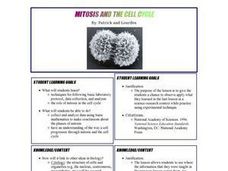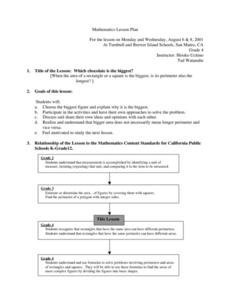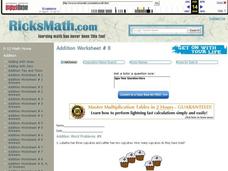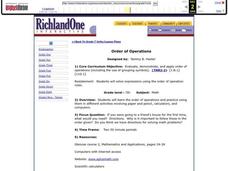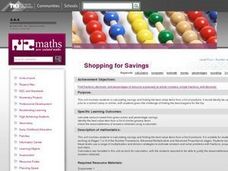Curated OER
Does Sunlight Effect Leaf Size?
Students make estimates and then measure leaves for accuracy. They calculate the area of the leaves by drawing an outline on graph paper and counting the squares. They compare the leaves exposed to sunlight to those that are in constant...
Curated OER
Fill and Wrap It Up
Students find the surface area and volume of the solid figures by measuring the length and the height of each face and base. They use concrete models to derive formulas for finding perimeter, circumference, area, surface area, and volume...
Curated OER
Shadow Casting
Eighth graders use a meter stick that is placed on a horizontal surface and an object is moved along it so that the shadow length can be measured at different distances from the light source. They solve real-world problems involving...
Helping with Math
Ratio and Proportion: More Writing Ratio
Three ratio word problems make up this concise assignment. Mathematicians compare blondes to redheads, red and white shirts, and action-adventure and sports video games. The write ratios to answer the questions. Use this as a class warm...
Curated OER
Coconut and Chocolate Chip Passover Macaroons
Recipies are a natural medium for using fractions in real-world problems. This delicious activity has learners adapting the ingredients for coconut and chocolate chip macaroons, a Passover treat, for fewer and more cookies than the...
Curated OER
The Air Up There
Learners observe the weather over a period of two weeks. They gather local weather data and calculate the mean and average figures from the data. They prepare a graph with their observations.
Curated OER
Math Dice Review Game
This lesson can be used to review any math operation across the elementary to high school levels. Young scholars review math operations by creating their own review problems using a specified number of dice and a white board (or...
Illustrative Mathematics
Data Transfer
A question to ask your class is, How fast is your Internet? That depends on the data transfer rate (DTR), which is the unit rate used in this activity. Math students will calculate how long it takes to download a music file and a video...
Curated OER
From There To Here...
Students find out where some of the products in hour homes come from, then become aware of our local trash, landfills and incinerators. They chart and graph data and use maps for different purposes.
Curated OER
Formula for Fitness
Many youngsters don't understand that fitness is a life-long endeavor, and that it really pays off to be healthy. Use a spreadsheet to document progress in a fitness plan to see if there really in a benefit to running and exercise. Adapt...
Curated OER
Mitosis And the Cell Cycle
Students determine the approximate time a cell spends in each phase of mitosis by counting cells in each phase from a prepared slide. They use a few simple calculations to estimate how long cells spend in each cycle in the body.
Curated OER
Which Chocolate Is The Biggest?
Students investigate the concepts of area and perimeter with the use of chocolate bars. They calculate the perimeter and area of different size rectangle chocolate bars and record the statistics. Then students make a visual comparison...
Curated OER
Orienteering - Lesson 1 - Maps & Map Scales
Lesson 1 of 10 lessons in this orienteering unit is about maps and map scales. After all, orienteering is all about maps, compasses, and finding ones' way around. It is imperative to be able to read maps and understand the relevance of...
Curated OER
Logic and Problem Solving: Math Hunt
In these math lesson plans, students discuss how math problems are written to reflect real-world situations. They complete an online Math Hunt using specific web tools, and work individually to create their own Math Hunts. Additionally,...
Curated OER
All About Me: Measuring Height and Weight
Students take personal fitness inventories. For this personal health lesson, students take measurements of their heights and weights. Students record the data, calculate their BMI, and then chart their physical activity.
Curated OER
Revision of the Four Rules (Decimals)
Upper elementary and middle schoolers read through an explanation of how to divide, multiply, add and subtract numbers with decimals. They complete an exercise with 48 problems. Pupils can click on the "Check" box to determine whether or...
Curated OER
Pendulums
First-time physicists experiment with pendulums in this physics lesson. They vary the weight of the bob, record how long each takes to complete ten period swings, and then calculate the time for one period. They repeat the procedure,...
Curated OER
Basic Subtraction Fact Worksheets to 20
Print this worksheet and have your helper pass it out. The class can use it to practice subtracting single and double-digit numbers up to 20. Some borrowing is required.
Curated OER
Beginning Addition Word Problems
In this finding the sums of word problems worksheet, students add the one-digit word numbers and numerals and use the pictures to assist them. Students solve four problems.
Illustrative Mathematics
Zeroes and factorization of a non polynomial function
Functions behaving badly: the squaring function and the absolute value function are both zero at x=0. Yet when you divide each by x, different things happen. Here, your class will explore each scenario as a means to adding depth to their...
Curated OER
How Many Cells Are Born in a Day?
Students predict the number of cells after a series of cell divisions. For this cells lesson students create a graph of their results and create a patterned drawing.
Curated OER
Matricies: Meadows or Malls?
Students explore the use of matrices and graphing calculators to solve a complex linear programming problem. They test their solutions to determine the best division of land use for the city.
Curated OER
Order of Operations
Seventh graders investigate the order of operations. In this seventh grade mathematics lesson plan, 7th graders explore the order of operations and practice using them in activities that involve paper and pencil, calculators and...
Curated OER
Shopping for Savings
Fourth graders calculate savings and identify the best value items from a list of products. They rotate through five studying stations, completing various math activities involving calculators and solving problems related to shopping...



